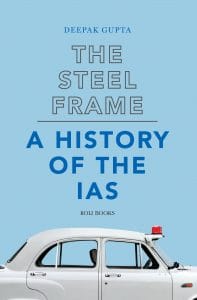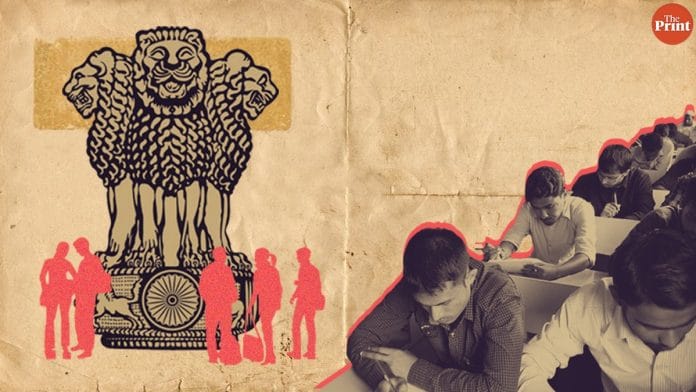There is a feeling that all the problems of India would disappear simply if the IAS is abolished, writes former UPSC chairman Deepak Gupta.
Virulent criticism has led to demands by some that IAS has outlasted its purpose and must be abolished. To proponents of continuity, the value of maintaining an All India Service was premised on three underlying beliefs – such officers would have a national rather than a parochial outlook, and along with their movement between the state and the centre, they would contribute to national unity; that an elite service would draw the best national talent which would provide for good governance necessary for the transformation of the country; and, that it would possess an ingrained sense of independence, commitment and impartiality which would protect democratic values and prevent political exploitation and arbitrariness.
Over time many have felt that the service has failed to meet any of these objectives satisfactorily nor does it now draw the best talent and, therefore, appears to have become an anachronism.
The most significant call, coming from within, would be from N.K. Mukherji, the last ICS officer to retire and who was cabinet secretary in 1977 in the Janata Government. He said: ‘Inveterate supporters of the IAS say, why pick on the IAS? Are other services, and indeed society itself, not equally affected? But if the IAS has sunk so low, it has lost its raison d’etre.’ He argued for decentralization and State Services. Decentralization is necessary but not a panacea for all structures. State Services suffer from even greater problems. Provincialization would be further advanced.
At the other end of the spectrum, there have been suggestions for an elite secretariat cadre filled largely by specialists through lateral entry after abolishing the IAS. This would actually lead to a complete fragmentation of the administration. Both suggestions have elements which should be implemented but abolition of the service is simply not a solution.
Also read: This Indore IAS officer has a solution for India’s garbage problem
In an undefined sort of way there is a feeling that all the problems of our country would disappear simply if the IAS is abolished. This arises also from the misconception or the deliberate attempt to arrogate all the policy failures, or the bureaucracy in general, on the IAS. Our Constitution makers provided for and designed the institutional architecture with great care and deliberation. Over several decades there have been attempts at their weakening, though they have shown resilience, which has been the strength of our democracy. Nevertheless, the first few months of 2018 witnessed a worrisome and serious crisis for these institutions.
…
Therefore, any talk of abolition, or even weakening, of another institution which brings stability and unity to the polity and country can only be a recipe for disaster. With the existing system getting so vilified because of the problems of political sociology, what would happen when this system is replaced by an unknown?
…
Let us briefly go back to the architects of the Constitution and the role they foresaw for the service. As we have seen, Patel argued vigorously in the Constituent Assembly for the IAS. He had also stated that ‘there are many impediments in the Constitution that will hamper us, but in spite of that, we have in our collective wisdom come to a decision that we shall have this model wherein the ring of service will be such that will keep the country under control (and intact).’ The service was assigned a protective role. Even Dr Ambedkar seemed to suggest this when he had stated that only members of the All India service could be appointed to the strategic posts throughout the Union. P.S. Appu, writing in 2005, and having witnessed from within and without the developments of that time, thus gave three reasons for retention of the service which are greater today than at any time in the past. First, it can offer resistance to the arbitrary actions of the politicians in power. Second, they could check the wrongful exercise of power in the states. Thirdly, the president and the Supreme Court are the guardians of the Constitution. But ordinary persons cannot easily reach them. It is only the civil and police administration, fearlessly upholding the Constitution and the law, that could make the millions of citizens enjoy the rights guaranteed under the Constitution.
Democracy appears to have been turned on its head with the apolitical civil service also being seen as the defender of the people. The IAS, therefore, has a key role in governance by constitutional design. It has been provided a certain aura and a somewhat privileged position to be able to have that moral authority to resist pressure, not to compromise, to work for a higher purpose, to assume a leadership role, and to form a ‘ring’ to protect the Constitution. And it is to this call that servicemen must respond.
…
Two decades ago a World Bank Report made the following performance assessment of the IAS: The IAS, successor to the ICS, the legendary “steel frame” of the British Raj, is today battling against onslaughts to its relevance.
…
I saw a surprisingly brief discussion online on the question why India can’t abolish the IAS. Two of the answers were as follows. First, they are a small set of people who make a large difference in people’s lives. Second, how can you be so sure that after abolishing the IAS whatever the government brings up will be transparent and crystal clear. Both are very valid arguments reflecting also a public perception. Government underperformance, and in this context, that of the IAS, is a complex problem
…
The World Bank report, in conclusion, noting that the IAS today must play a crucial role in leading a change in the country and ushering in reforms in different sectors asks the question – does it have the vision to reform itself into a less power-hungry, more efficient, more transparent and leaner agent of change?
Also read: An ex-IAS officer on how politicians (mis)use civil servants—and the way out
The study on the service lists its key elements – act according to the law; maintain high standards of conduct, both personal and professional; ensure financial, intellectual and professional integrity; maintain political neutrality; refuse individually and collectively to submit to political interference; faithfully and fully carry out policies of elected governments regardless of personal preference. It has been argued that this will happen only by each and every IAS officer internalising the ethos of the honour code and conforming to it no matter the provocation or temptation to infringe it. It means championing change, pursuing public good with passion and professionalism, acting without fear or favour accepting challenges, no matter how daunting and letting actions and results speak for themselves. It means reviving the old espirit de corps where officers stand up for each other in order to uphold public good…once the IAS begins on this mission of reinventing itself, its effects will ripple through the system galvanising change…. bringing about transformation from ‘chalta hai’ to ‘badal sakta hai’. Reform, yes and urgently so. Abolish, No. The reform agenda has been outlined. It is critical that espirit de corps, which Sardar Patel called for in his first address to IAS officers, be rejuvenated and a positive professional identity recreated.
…
India desperately needs it.

This is an edited excerpt from ‘The Steel Frame: A History of the IAS’ by Deepak Gupta. Republished with permission from Roli Books
The author was an IAS officer from the 1974 batch. After retirement, he consulted with the World Bank and UNIDO and writes on issues of energy and sustainable development. He was Chairman of UPSC from November 2014 to September 2016.






